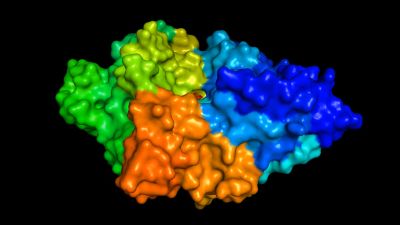Super-Enzyme that eats plastic could be significant leap forward in pollution crisis

Scientists from Portsmouth say they've discovered a new solution in tackling the planets plastic pollution crisis.
A new enhanced 'super-enzyme' can eat certain plastics- used in soft drinks and fruit juice packaging- six times faster than natural degradation of plastics- which can take hundreds of years.
Report by ITV News Meridian's Ravneet Nandra:
Your everyday biological washing powder breaks down those tough stains on your clothes. That's all down to enzymes- tiny biological molecules that speed up chemical reactions. Enzymes also break down plastics but at a much slower rate.
Now, scientists from the University of Portsmouth say they have engineered an enzyme that eats plastics at a super rate. A 'Super-Enzyme'.
It's made up of 2 enzymes produced by a type of bacteria that feeds on plastic bottles.
Plastic that ends up in our ocean today take hundreds of years to break down naturally. However, this super enzyme is able to break down certain plastics used in soft drink and fruit juice packaging, and even beer bottles - 6 times faster!
The team used intense X-ray beams at the Diamond Light Source facility in Harwell, Oxfordshire to map 3D structures of the enzymes.
Professor John McGeehan, director of the Centre for Enzyme Innovation at the University of Portsmouth
In 2018, Prof McGeehan and his team accidentally discovered that an engineered version of one of the enzymes, known as PETase, was able to break down plastic in a matter of days.
As part of their current study, published in the journal Proceedings of the National Academy of Sciences, the team mixed PETase with the second enzyme, called MHETase, and found "the digestion of the plastic bottles literally doubled".
The researchers then connected the two enzymes together in the lab, like "two Pac-men joined by a piece of string", using genetic engineering.
Experts say the impact of plastic pollution is getting worse, as we increase our use of PPE during the Covid-19 crisis.
This new enzyme could be a significant leap forward in breaking down and reusing plastics.
The team hopes to one day produce the enzyme on an industrial scale, in what could be a ground-breaking discovery for our generation.